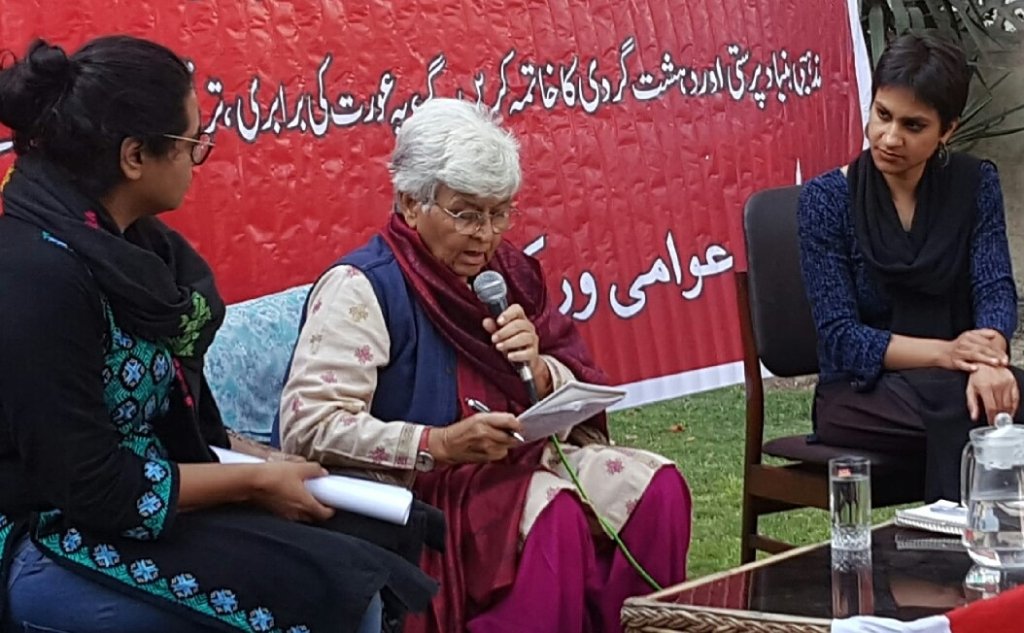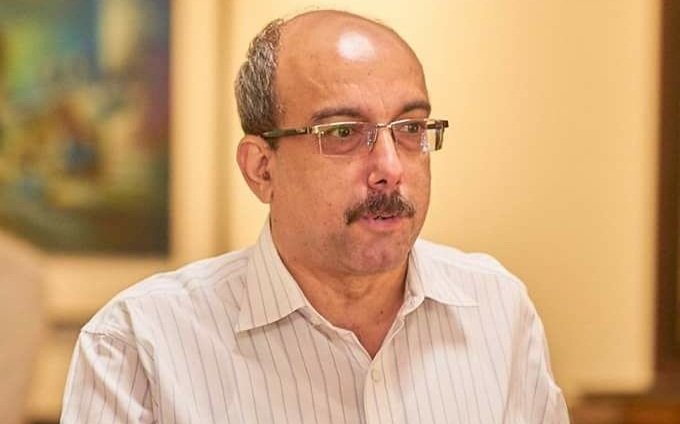By Naazir Mahmood
They did not have any soft spot for dictatorial attitudes; neither did they brook any incorrectness of behaviour or language that turbocharged masculinity. They offered solutions rather than peddle conservatism and nostalgia. Their feminist ideological positions were strong but without any virulence. They were Rubina Saigol and Kamla Bhasin.

We lost them within a month; Rubina succumbed to the coronavirus in Lahore on Aug 27, 2021, and Kamla lost her battle against cancer in Delhi on Sept 25. Their departures have left South Asian activism intellectually poorer. I have fond memories of them and feel a personal loss at their passing. One could not find any fragility in their arguments and reasoning. Both abhorred lousy versions of gender-based submission, and their advice to women was to be able to pack a punch to patriarchy. Kamla and Rubina could outsmart their male counterparts, and they suggested that all women attempt to do that.
Both were convinced that women were better positioned for future success if they understood feminism correctly and practised it in their lives. Kamla Bhasin and Rubina Saigol were leading feminists of this region and shared many common traits. Kamla launched the South Asian edition of One Billion Rising (OBR) in 2017 in Nepal, when she was already over 70 years of age. It is a global campaign against violence against women. She was born in 1946 near Mandi Bahauddin in undivided Punjab and migrated with her parents to India after Partition.
Kamla and Rubina were not the ones to sit quietly when at least one billion women around the world suffer violence every year, hence the campaign One Billion Rising. They wanted our women to say ‘enough is enough and rise with one voice against gender-based crimes, rather than suffer in silence. For both, feminism was not simply an ideology; it was a war against oppression and to counter all sorts of sexism in all societies. Essentially, their feminism was a call for equality and justice for women across the globe. Both urged women to take up creative actions and forge solidarity.
They were part of many civil society organisations as their motto was not to fight alone but in groups and associations. Another common trait between them was that they did not confine their struggles to women’s issues alone. Protecting minority rights was also their agenda that they followed in their actions and writings till their last days. While Rubina was a Pakistani feminist scholar and educationist, she shared her activism for women’s rights with Kamla. Both authored and edited several books and papers in at least two languages and both were proficient in English, Hindi/Urdu, and Punjabi.
Their scholarly works explore the themes of education, gender, and nationalism as they played out in post-partition years in the Subcontinent. Ethnicity and its relationship to feminism and human rights emerge prominently in their writings. Religious radicalisation was anathema to both, and that was one reason they tried to expose the role of states in fanning terrorism while pretending to counter it. Just as Rubina was one of the pioneers of Ajoka Theatre, an active member of Simorgh and the Women’s Action Forum (WAF), Kamla also used various forums and platforms such as Sangat to voice her concerns and protests.

Rubina Saigol completed her PhD in education at the University of Rochester and MA in psychology at Columbia University and went on to author dozens of books and hundreds of articles on subjects close to her heart. One of her best books is ‘Pakistan Project: A Feminist Perspective on Nation and Identity. It explores the idea of Pakistan from Sir Syed Ahmed Khan to M A Jinnah from a gender perspective. She was brave enough to expose the assumptions and contradictions inherent in the idea of Pakistan. Similarly, Kamla’s scholarly works also appeared in several international research journals on diverse themes, most of them dealing with gender and feminism.
Kamla and Rubina attempted to document the direction and history of women’s rights movements in South Asia. Their absence will be felt most by those who considered them as their mentors. They served as guides and teachers to their colleagues, wherever they worked. We drew inspiration from them to carry on their struggles in whatever way we could. Curriculum and gender in education were their specific areas of interest, and they discussed and debated them in both spoken and written forms. Both were great team players and ever ready to learn from others, and even keener to teach.
Interestingly, Kamla and Rubina – despite their diverse personal experiences – lived fully, and on their terms. They were known for their fun-loving natures, and their generosity knew no bounds. Their creative talent was unique as they both partook of all sorts of expressions from poetry and prose to satire. When you read their writings, you feel that their clarity of thought reflects in their diction. There are many other writers on similar issues, but Kamla and Rubina believed in an accessible writing style, with critical thinking embedded in it. They were free spirits and cherished fluidity in life.
Perhaps their biggest achievement was their ability to bring smiles to their audience and readers, as both were keen to contribute to other people’s lives. During their nearly half a century of active life, they graced many gatherings and occasions, and participated in parties across the globe; these were events that were full of magnanimity and high spiritedness. They imparted bravery and courage through their discourses which were compassionate and powerful. They preferred – and encouraged other women to do – things that many in their societies considered unbecoming to a woman.
For example, Kamla loved to do symbolic acts of defiance and empowerment. When she conducted Sangat workshops on feminist capacity building, those who attended were ready to break gender barriers and take on the world. Rubina was also a social scientist as well a gender activist who nurtured young feminists. Both spent their entire lives enabling others to understand feminism and gender so that they could monitor misogyny and patriarchy in communities and societies. One message that I received whenever I met them was that unless women are free, men cannot be free.
As Kamla used to say time and again, “the struggle for gender equality is not between men and women, it is among two ideologies: one that says patriarchy is better, and the other that says equality is better.” Kamla explained patriarchy as the exploitation of women whereby men control women’s mobility, physical and reproductive powers, and even sexuality; it is based on violence or the threat of violence. If you apply that to countries such as Bangladesh, India, and Pakistan, how true it appears. Rubina too believed the same and promoted diversity, not gender differences.
We learnt from them that the stress on gender differences created to control, discrimination, and exploitation. Kamla and Rubina did not want to dehumanise men by boxing them into expectations of protecting women, as it is like ingraining the use of violence as normal. For nearly half a century, both worked for a gender-just society, and they saw the women’s movement change in their lifetime. In addition to education and other rights for women, Kamla and Rubina were particularly concerned about the cultural discrimination that persists in societies, especially in South Asian countries.
If we need to carry their struggle forward, we must be anti-misogynistic. We must demand more representation of women in legislative bodies. We must demand that marital rape be recognised as a crime and challenge all forms of cultural and religious patriarchy.

Dr Naazir Mahmood is an Islamabad-based journalist, author and political commentator. He can be reached at: mnazir1964@yahoo.co.uk

